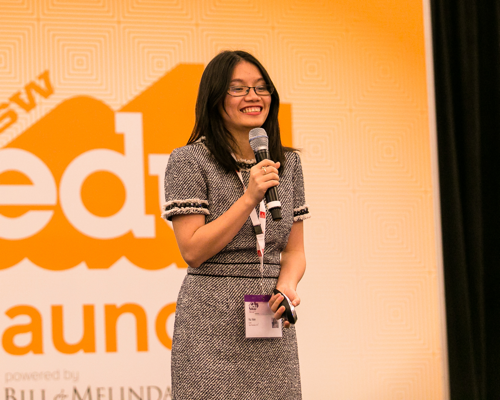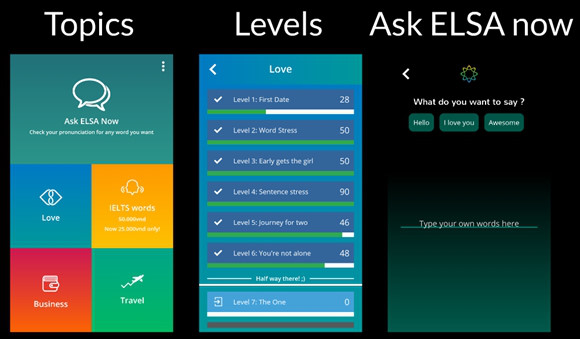The Vietnamese app using artificial intelligence to improve English speaking skills
(VNF) - A mobile application for English pronunciation co-developed by two Vietnamese women took home first prize at the 2016 Launch Startup Competition in Texas promoting innovation in learning.
The app, named ELSA, or English Language Speech Assistant, was co-developed by 33-year-old Van Dinh Hong Vu, 29-year-old Ngo Thuy Ngoc Tu, and Dr. Xavier Anguera from Spain.
 |
Van Dinh Hong Vu, co-developer of ELSA, at SXSWedu 2016 Launch Startup Competition in Texas, March 10th. (Photo by courtesy of Van Dinh Hong Vu)
In March 2016, Van has debuted ELSA during SXSW, and the product won the SXSWedu launch competition. ELSA is a mobile app that uses AI to help people improve their pronunciation. Users can access different curriculum options based on their interests, such as travel or professional settings.
They’re then lead through a series of vocabulary words and phrases, and ELSA’s algorithms analyze their speech. If ELSA detects a mispronunciation, it tells the user not only how the word should sound, but also how to move the tongue and lips to form the correct word.
“When people can’t hear the difference themselves, hearing an American voice is a good step but it’s not enough unless you have an ear for languages,” Van said. That’s especially true for people whose native languages don’t include some of the most common sounds heard in English.
Van said to a reporter of Forbes that she realized her and other friends who were living and working in foreign countries; their pronunciation of English words was holding their back from communicating effectively. They all shared a common frustration that stemmed from pronunciation hurdles. But hiring a private tutor is costly, especially for full-time students.
“That’s not really accessible for a lot of people,” Van said. She decided to find a better solution.
She had been following developments in machine learning and thought the technology could help solve the pronunciation problem. She also hadn’t seen much crossover between machine learning and language education up to that point.
Companies in the Bay Area “don’t pay attention to language learning [in this way] because they’re mostly American,” Van said in the article of Forbes. But after surveying her friends, many of whom also grew up learning English in Vietnam, “I know that the market is there.”
 |
Screenshots of the interface of ELSA
Van said she and the ELSA team have fed “hours and hours” of speech data into the system. They’ve also worked with speech therapists to identify key problem areas for people learning English in different parts of the world.
“It will never be 100% accurate, but the more data we have, the more accurate it will be,” she said.
ELSA’s curriculums do not include lessons on grammar or vocabulary memorization because other apps, such as Duolingo, already do those well, Van said. She views ELSA as a tool for intermediate users to take their English skills to the next level.
An updated version of ELSA will launch in late September or early October, and it will allow users to declare their mother tongues so that the program can tailor the experience to their needs. The new version will also include an expanded curriculum.
Vietnamese users currently make up 30-35% of ELSA’s user base, Van said. Vietnam is serving as the company’s pilot market, although Van noted that it’s attracted users from Japan, Indonesia, Thailand, the Middle East and Europe.
But for now, Van’s primary focus is on helping expand English education in her native country, she said.
“I want people from home to learn English and have more opportunities in life.”
ELSA users can play pronunciation games or read aloud from different dialogues in various topics such as love, profession, and travel, with over 30 games and 3,000 common words or phrases currently available, according to the SXSWedu website./.
Minh Phuong
Recommended
 Handbook
Handbook
Vietnam Moves Up 8 Places In World Happiness Index
 Handbook
Handbook
Travelling Vietnam Through French Artist's Children Book
 Multimedia
Multimedia
Vietnamese Turmeric Fish among Best Asian Dishes: TasteAtlas
 Handbook
Handbook
From Lost to Found: German Tourist Thanks Vietnamese Police for Returning His Bag
Popular article
 Handbook
Handbook
Prediction and Resolution for the Disasters of Humanity
 Handbook
Handbook
16 French Films To Be Shown For Free During Tet Holiday In Vietnam
 Handbook
Handbook
Unique Cultural and Religious Activities to Welcome Year of the Snake
 Handbook
Handbook



